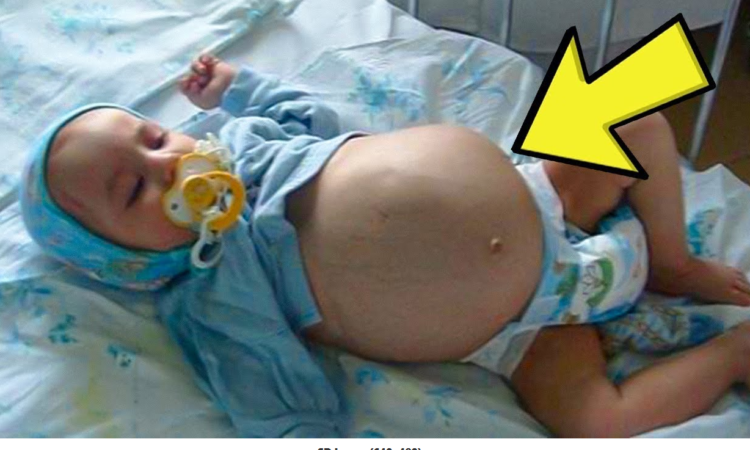
Angela and Jonah Robins had always been the ideal couple. Upon learning they were expecting, they were overjoyed. The news that they were having a baby girl only added to their excitement. They prepared with great anticipation—reading books, attending birthing classes, and eagerly awaiting the arrival of their daughter.
When Briana was born, she appeared perfectly healthy. Her parents were ecstatic, marveling at her tiny fingers and toes for hours. Their new life as a family began with love and laughter.
But a few days after bringing Briana home, Angela noticed something odd—her baby’s stomach always looked bloated. Initially, she assumed it was digestion issues and tried everything from Gripe Water to feeding adjustments. But nothing worked. The baby remained bloated, and her stomach seemed to grow bigger each day.
Angela’s concern turned into panic. She urged Jonah to take Briana to the hospital immediately. Calmly, Jonah insisted, “If she’s still bloated in the morning, we’ll go.” Unfortunately, that delay would cost them dearly.
The next morning, Angela rushed to check on her daughter—and screamed. Briana’s body had changed. Her skin was yellow, and her stomach was more distended than before. Jonah dropped to his knees in horror.
They rushed her to the emergency room. A pediatrician named Dr. Hansen examined Briana and ordered a series of tests. “It could be something minor or serious,” he said. “We’ve given her supplements while we wait for the test results.”
But Angela and Jonah already knew something was terribly wrong. The yellowing didn’t disappear, and Briana’s stomach continued to swell. Despite her alarming symptoms, Briana remained playful and cheerful—oblivious to the storm surrounding her.
After multiple tests, the doctors finally diagnosed Briana with biliary atresia—a rare condition where the bile ducts are blocked or absent, preventing bile from draining from the liver. Without a functioning gallbladder or liver, Briana would need a liver transplant to survive.
The news hit hard. Angela and Jonah were shattered. They spent sleepless nights researching the condition, reaching out to specialists, and praying for a miracle.
Months passed without finding a donor. Briana grew weaker each day. Finally, Jonah made a brave decision—he would donate part of his liver to save his daughter. Angela was hesitant, but Jonah insisted. “She’s my daughter. I’ll do whatever it takes.”
But then came seemingly good news: a donor had been found—an elderly man named Arthur whose liver was still healthy. The procedure was scheduled.
Angela and Jonah were at the hospital on the day of the surgery. Tension hung heavy in the air. But as the hours passed, something strange happened—Jonah suddenly stormed into the operating theater, screaming.
Six security guards dragged him out as he shouted, “That’s my daughter in there! Let me go!”
Angela was horrified. What had Jonah seen?
Moments later, a fleet of police cruisers arrived at the hospital. Dozens of officers stormed the building. Angela ran toward the operating room, desperate to know what was going on.
What she saw chilled her to the bone.
Arthur—the supposed donor—was being wheeled out on a gurney, conscious, with a bloody nose. Two surgeons were being handcuffed, their scrubs stained with blood. Angela screamed, “What’s happening? Where’s my daughter? Whose blood is that?”
No one answered.
Eventually, a serious-looking man in plain clothes approached Angela. “I’m Chief Inspector Martin Kelvin,” he said. “Your family is at the center of an ongoing investigation.”
He revealed the horrifying truth: the “donor” and the two surgeons were part of a criminal ring. They targeted desperate parents, offering fake organ donations. Instead of saving children, they declared them dead during surgery and sold their organs on the black market.
Angela was speechless.
The inspector added, “Your husband saved your daughter’s life. He called us after realizing the donor was fully awake and walking around, which shouldn’t have been possible.”
Still shaken, Angela found Jonah in a waiting room. He looked devastated. But despite everything, he stood firm. “I’m going to do what I should’ve done from the start,” he said. Jonah was determined to donate part of his own liver.
The surgery was scheduled. Jonah was prepped, and Angela watched as the doctors wheeled him into the operating room. The procedure was a success. Briana’s transplant was scheduled for later that same day.
Angela and Jonah waited anxiously. Jonah, still weak from surgery, refused to rest. He needed to be there.
Hours passed. Doctors emerged from the operating room, visibly exhausted. Angela ran to them, desperate for news.
“The surgery was complicated,” one of them said. “We’ve kept her sedated to monitor how her body reacts to the transplant. It will take a few days before we know if the operation was successful.”
The couple held onto hope. They stayed by Briana’s side day and night, praying for a sign.
Then, one morning, the miracle came.
Briana opened her eyes.
She smiled and reached out for her parents. It was a small gesture, but it meant the world. Angela cried. Jonah’s tears flowed freely. Their baby was still with them.
In the weeks that followed, Briana’s health improved. The yellow faded from her skin, and she began gaining weight. She looked more and more like a healthy little girl.
Angela and Jonah took her home. They attended every doctor’s appointment together, never letting their guard down. They cherished every moment, knowing how close they had come to losing her.
Jonah took two remote jobs to pay for her care, refusing to miss a moment of her life.
They had survived the unthinkable. And although Briana’s journey was far from over, Angela and Jonah were stronger than ever. They learned to appreciate life, love, and each other in ways they never thought possible.
And every time Briana smiled, they were reminded: they had witnessed a miracle.




